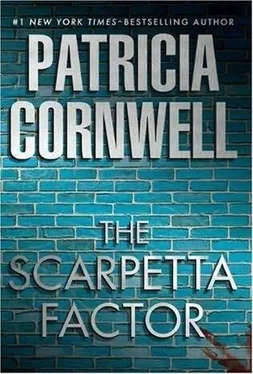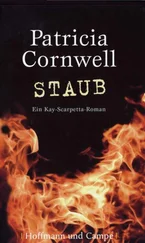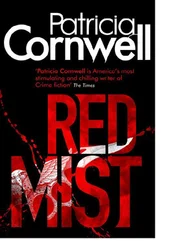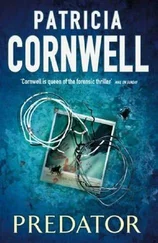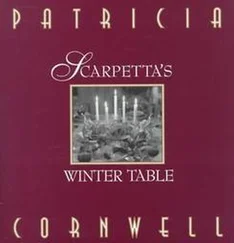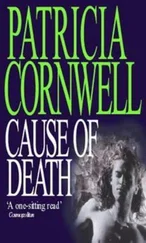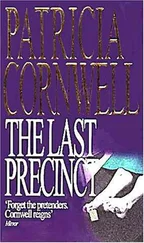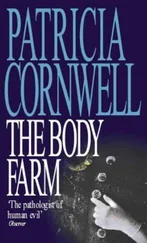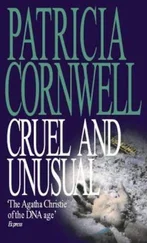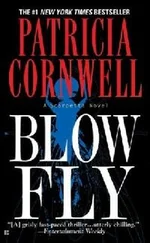Lucy was the calm voice of reason because inside she was screaming and not about to wait for anyone.
“What Tac are you on if I see anyone?” she asked Marino.
“Tac I,” he said.
Lucy walked quickly toward Central Park South, and when she turned the corner, she started to run. At the back of the mansion was an apron of pavers that led to a wooden garage door, a swinging door painted black that opened on the left side, and nearby was a uniform cop Lucy had met earlier. He was probing shrubbery with his flashlight, the four floors above him dark, not a single window lit up.
“Tell you what,” Lucy said, unzipping the bag and pulling out the thermal scope. “I’ll hang back here and check the windows for heat. You might want to head around to the front. They’re thinking of kicking in the door.”
“Nobody’s called me.” The officer’s face looked at her, his features indistinguishable in the irregular glow of streetlamps. In a nice way, he was telling Berger’s computer nerd to fuck off.
“The A team’s en route and nobody’s going to call you. You can check with Marino. He’s on Tac Ida.” Lucy powered on the thermal scope and trained it at windows overhead and they turned murky green in infrared, the draperies across them splotched grayish white. “Maybe some radiant heat from hallways,” she said, and the officer was walking off.
Out of sight, gone, on his way to a forced entry that wasn’t about to happen where he was going. It was about to happen where he’d just left. Lucy got out the Rabbit Tool, a handheld hydraulic spreader capable of exerting ten thousand pounds of pressure per square inch. She worked the opposing tips of the jaws between the left side of the garage door and the frame, and started stepping on the foot pump, and wood strained and then several loud pops as iron strap hinges bent and snapped. She grabbed her tools and worked her way through the opening, pulling the door shut behind her so the breach wasn’t obvious from the street. She stood inside the cool dark, listening, orienting herself inside the lower level of the Starr garage. The thermal scope wasn’t going to help her in here, all it did was detect heat, and she got out her SureFire light and turned it on.
The mansion’s alarm system was unarmed, suggesting that when Bonnell and Berger had showed up, the person who let them in must not have reset the security system. Maybe Nastya, Lucy thought. She had met her the last time she was here and remembered the housekeeper as a careless and self-important woman, a recent hire of Hannah’s, or maybe Nastya was one of Bobby’s picks. But it had struck Lucy as peculiar that people like Nastya suddenly were part of Rupe’s life. They weren’t his type, and the decision likely hadn’t been his, and it caused Lucy to wonder what really had happened to him. She didn’t think it was possible to murder someone with salmonella, and it wasn’t likely there had been a mistake in the diagnosis, not in Atlanta, a city known for its Centers for Disease Control and Prevention. Maybe he’d willed his own death because Hannah and Bobby were cannibalizing his life and he knew what was ahead, which was to have nothing left, to be old and powerless and at their mercy. It was possible. People did that. Got cancer, got in accidents, short-circuiting the inevitable.
She set down her bag and slipped her Glock pistol out of its ankle holster, the long beam of the tactical light probing her surroundings, licking across whitewashed stone walls and terra-cotta tile. Directly left of the garage door was a bay for washing cars, and water slowly dripped from the end of a sloppily coiled hose, and filthy towels were scattered over the floor, a plastic bucket turned on its side, and nearby several gallons of Clorox bleach. There were shoe prints and a lot of tire tracks, and a wheelbarrow and a shovel, both crusty with dried cement.
She followed wheel marks on the floor and more footprints, different treads, different sizes, and a lot of dust, maybe a running shoe, maybe a boot, at least two different people but possibly more. She listened and probed with the light, knowing what the basement was supposed to look like and noting what was different, finding signs everywhere of activity that had nothing to do with anyone maintaining vintage cars anymore. The powerful beam cut across a work area with benches, pressure tools, gauges, air compressors, battery chargers, jacks, cases of oil, and tires, all dusty and randomly placed, as if moved out of the way but unused and unappreciated.
Not at all like the old days, when you could eat off the floor because the garage was Rupe’s pride and joy, that and his library, the two areas connected by a hidden door behind a painting of ships. The light moved across thick dust and cobwebs on a lift he’d installed when grease pits weren’t legal anymore, were deemed unsafe because of carbon monoxide in the hole when a car engine was running. There didn’t used to be a mattress, a bare one near the wall, covered with large brown stains and swipes, what looked like blood, and Lucy saw hairs, long ones, dark ones, blond ones, and she detected an odor or thought she did. Nearby was a box of surgical gloves.
About ten steps away was the old grease pit, covered with a painter’s drop cloth that didn’t used to be there. The surrounding floor was crazed with tread marks similar to others Lucy had seen, and there were spatters and smears of dried concrete. She squatted to lift an edge of the tarp, and under it were wide sheets of plywood, and under those her light illuminated the pit, and at the bottom of it was an uneven layer of concrete that wasn’t very deep, not even two feet. Whoever had shoveled in the wet cement hadn’t bothered to smooth it, the surface irregular and rough with mounds and peaks, and she thought she detected an odor again and was acutely conscious of her gun.
Walking more quickly now, she followed the ramp, staying close to the wall, up to the next level, where Rupe Starr had kept his cars, and as the incline bent around, Lucy began to see light. Her boots were quiet on Italian flooring that used to be immaculate, now dusty and scarred with tire tracks and scattered with a lot of sand and salt. She heard voices and stopped. Women’s voices. She thought she heard Berger. Something about being “ blocked in” and a different voice saying, “Well, someone did” and “We were originally told,” and several times the phrase “Clearly not true.”
Then, “What friends? And why didn’t you tell us this before?” Berger asked.
This was followed by an accented voice, muffled, a woman talking fast, and Lucy thought of Nastya and listened for a man, for Bobby Fuller. Where was he? The message Berger had left Marino while he and Lucy were still in the training lab without their phones was that Berger and Bonnell were meeting with Bobby. Supposedly he had flown in from Fort Lauderdale early this morning because of what he’d heard on the news about Hannah’s head hairs being found, and Berger had asked to talk to him again because she had a number of questions. He’d refused to meet her at One Hogan Place or any public place and had suggested the house, this house. Where was he? Lucy had checked, had called the Westchester airport tower, had talked to the same controller who was always so rude.
His name was Lech Peterek, and he was Polish and dour, very unfriendly on the phone because that was who and what he was, had nothing to do with who or what Lucy was. In fact, he didn’t seem able to place her until she recited tail numbers, and even then he had been vague. He’d said there was no record of an arrival today from South Florida, not the Gulfstream Bobby Fuller and Hannah Starr routinely flew on-Rupe’s Gulfsteam. It was still in its hangar and had been for weeks, the same hangar Lucy used, because it was Rupe who had brokered her purchases of aircraft. It was Rupe who had introduced her to remarkable machines like Bell helicopters and Ferraris. Unlike Hannah, his daughter, he had been well-intentioned, and until his death, Lucy had felt no insecurity about her livelihood and hadn’t imagined anyone wanting to ruin it for the hell of it.
Читать дальше
